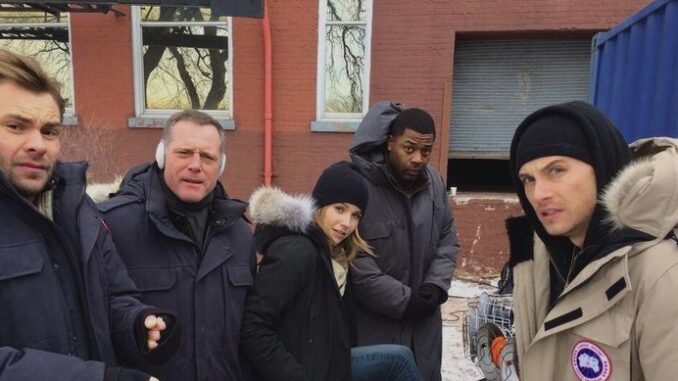
There are character deaths on television that feel like storytelling. And then there are deaths that feel like personal grief. For fans of Chicago P.D., the loss of Alvin Olinsky wasn’t just a moment of plot development—it was heartbreak, pure and raw. It was the kind of moment that hits so hard, you remember exactly where you were when it happened. You remember how you shouted at the screen, how your chest ached watching Voight’s face crumble, and how, even after the credits rolled, the pain lingered. Because when Olinsky died, something fundamental in the show—and in Voight—died with him.
Alvin Olinsky wasn’t flashy. He wasn’t the loudest, the most decorated, or the most quoted. But he was the soul of the Intelligence Unit. The steady one. The quiet compass. The man who had seen too much and carried it with a stoic grace. And more than anyone else, he was Voight’s man. His closest ally. His oldest friend. A brother forged in blood and fire. So when Olinsky was framed, arrested, and left to rot in prison while Voight scrambled helplessly from the outside, it wasn’t just a story—it was a slow-motion tragedy.
The episode of his death was cruel in its restraint. We didn’t see a dramatic shootout, no final moment of glory. We saw Olinsky stabbed in prison—ambushed like a common criminal. We saw him wheeled into surgery, fighting for life while his brothers and sisters in blue waited with bated breath. And then… silence. The kind of silence that Chicago P.D. reserves for its most devastating moments. The moment when Voight gets the call—the long pause, the helpless breath, the finality in his eyes—that wasn’t acting. That was grief being laid bare.
What followed was perhaps the most vulnerable version of Voight the audience had ever seen. For a man built on rage and vengeance, his response was almost too quiet. He sat. He stared. He broke. Because this wasn’t a random tragedy. This was his fault—and he knew it. Voight had walked the line for years, bending rules, making enemies, pushing limits in the name of justice. And this time, it wasn’t him who paid the price. It was Olinsky. The loyal one. The one who never questioned Voight’s methods, never turned his back, never asked for anything in return.
The writing in this episode was masterful. It didn’t try to explain away the pain. It didn’t offer redemption. It gave us space to mourn. Each character’s reaction was nuanced and deeply human. Ruzek’s anger. Atwater’s disbelief. Upton’s quiet sorrow. But it was Burgess who said what everyone felt: “He didn’t deserve this.” And he didn’t.
Fans erupted online. Social media was flooded with tributes to Olinsky—quotes, screenshots, and stories about how his calm presence made the Intelligence Unit feel like a family. Hashtags like #JusticeForOlinsky and #BringBackAlvin trended for days. And even as the show moved forward, the hole he left behind never really closed. Every time someone mentions his name in a later season, there’s a pause—a weight. Because he mattered. And because Voight has never truly recovered.
And maybe he’s not supposed to. Because the brilliance of Chicago P.D. is that it doesn’t pretend loss can be solved. It shows you what grief does—how it hardens a man, isolates a team, and redefines loyalty. After Olinsky’s death, Voight changed. He became colder. More dangerous. Less forgiving. Because when you lose the one person who always had your back, you stop trusting anyone to catch you.
This episode wasn’t just about a character dying. It was about consequences. For years, the show let Voight blur the lines—punching suspects, covering up crimes, making deals in back alleys. And fans rooted for him because he got results. But Olinsky’s death was the cost of all those choices. And it was the first time Voight couldn’t outrun the fallout. The first time his pain wasn’t just internal—it was public, and permanent.
But let’s not forget one thing: Olinsky chose loyalty. Even when he could have turned on Voight to save himself, he didn’t. He kept his mouth shut. He protected the man who had walked with him through hell. And that loyalty cost him his life. In doing so, he became a tragic hero—not because he fought for justice, but because he fought for family. And in the world of Chicago P.D., that means everything.
Today, years after his death, Olinsky’s shadow still looms large. New characters come and go, alliances shift, cases blur the line between right and wrong—but no one has ever truly filled the space he left behind. Because he wasn’t just a team member. He was the heart of the Intelligence Unit. And when that heart stopped beating, the entire show took on a darker tone—one that hasn’t lifted since.
